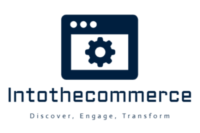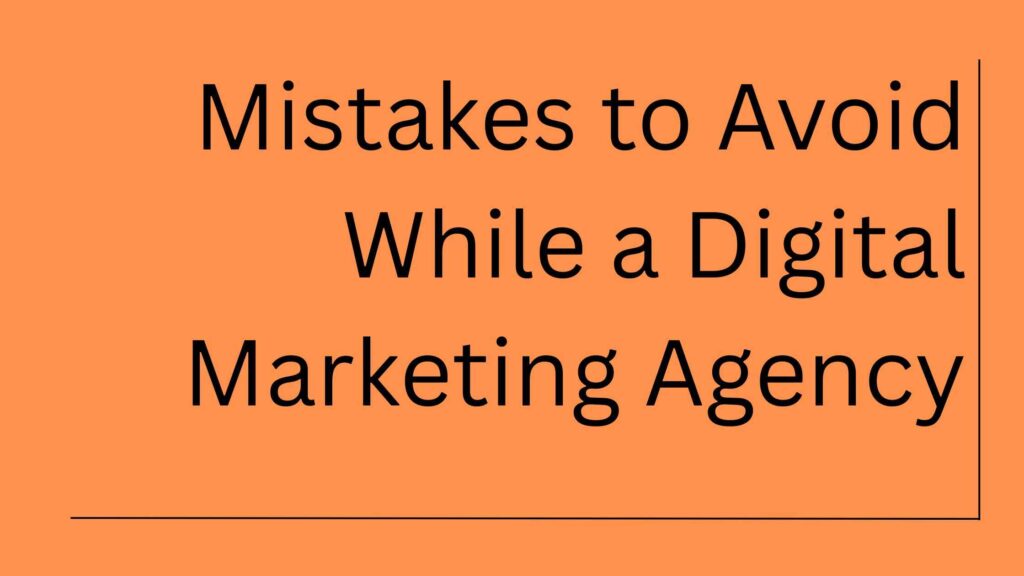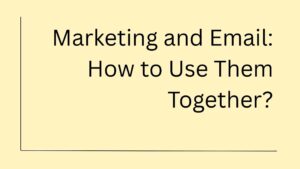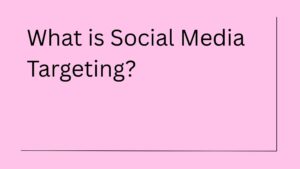So choosing the right digital marketing agency feels overwhelming. You’re juggling dozens of proposals, listening to countless pitches, and trying to figure out who actually knows what they’re talking about. The stakes are high, too. Choose wrong and you might watch your marketing budget disappear with little to show for it.
The industry has seen businesses make the same mistakes over and over. Some are obvious red flags you can spot from miles away. Others are subtle traps that even experienced marketers fall into. The thing is, most of these mistakes are preventable if you know what to look for.
Your marketing agency will essentially become an extension of your team. They’ll represent your brand, speak to your customers, and influence how people see your business. Getting this decision right matters more than you might think.
By following these tips, you’ll not only protect your business from potential marketing-related issues while choosing a digital marketing agency. But also ensure that your business is scaled within budget and meets the quality standards you expect.
Common Mistakes in Hiring a Digital Marketing Agency
The digital marketing space changes fast. What worked last year might not work today. This makes choosing an agency even trickier because you need partners who can adapt and grow with your business. Here are the mistakes that cost businesses time, money, and opportunities.
1. Falling for Unrealistic Marketing Promises
Some agencies promise the moon. They’ll guarantee first-page Google rankings in 30 days or promise to triple your leads overnight. These claims sound appealing, especially when you’re under pressure to see results quickly.
The reality is different, though. Real marketing takes time. SEO campaigns need months to show meaningful results. Social media growth happens gradually. Even the best PPC campaigns require testing and optimization before they perform well.
Consider a business owner who hired an agency that promised to get them 10,000 new followers in a month. They delivered, sort of. The followers turned out to be fake accounts from click farms. The engagement was nonexistent, and the whole thing actually hurt their credibility.
How to avoid this:
- Ask for realistic timelines and explanations of how they’ll achieve results
- Request case studies showing gradual, sustainable growth rather than sudden spikes
- Be suspicious of agencies that guarantee specific rankings or follower counts
- Look for agencies that discuss testing, optimization, and long-term strategy
2. Choosing Agency Based on Price Alone
Budget matters. Every business has financial constraints, and you need to be smart about spending. But picking the cheapest option often backfires in marketing.
Low-cost agencies might cut corners in ways that hurt your results. They might use outdated tactics, assign junior staff to your account, or spread their resources too thin across too many clients. Sometimes they’re cheap because they’re learning on your dime.
On the flip side, expensive doesn’t always mean better. Some agencies charge premium rates but deliver mediocre results. The key is finding value, not just low prices.
How to avoid this:
- Compare what’s included in different pricing tiers
- Ask about the experience level of team members who’ll work on your account
- Request references from clients with similar budgets
- Consider the potential ROI, not just the upfront cost
- Understand what happens if you need additional services
3. Not Checking References Properly
Most people ask for references but don’t actually call them. Or they ask surface-level questions that don’t reveal much useful information. This is a missed opportunity to learn about an agency’s real strengths and weaknesses.
Previous clients can tell you things you’ll never learn from a sales presentation. They know if the agency actually listens to feedback, how they handle problems, and whether they deliver on their promises.
But here’s something interesting.
Not all references are created equal. Some agencies only provide references from their best clients or most successful campaigns. You want to hear from clients with challenges similar to yours.
How to avoid this:
- Always call at least two references, preferably three
- Ask specific questions about communication, results, and problem-solving
- Request references from businesses similar to yours in size or industry
- Ask references what they would do differently if hiring again
- Find out why any clients have left the agency
4. Ignoring Cultural Fit
Skills matter, but so does personality. You’ll be working closely with your agency team for months or years. If your communication styles clash or your values don’t align, even the most talented agency might not work out.
Some agencies are very formal and process-driven. Others are casual and flexible. Neither approach is inherently better, but one might fit your company culture better than the other.
In the past, many partnerships fell apart not because of poor results, but because the client and agency just couldn’t work together effectively. The agency might have been brilliant, but if they don’t understand your business or communicate in a way that works for you, the relationship suffers.
How to avoid this:
- Meet the actual team members who’ll work on your account
- Pay attention to how they communicate during the sales process.
- Ask about their preferred working style and meeting frequency
- Discuss how they handle disagreements or conflicting priorities
- Trust your gut feeling about whether you can work with them long-term
5. Failing to Define Clear Marketing Goals
This one’s partly on you. Many businesses hire marketing agencies without clearly defining what success looks like. They have vague goals like “more leads” or “better brand awareness” but don’t specify numbers or timelines.
Agencies can’t read minds. If you don’t tell them exactly what you want to achieve, they’ll make assumptions. Those assumptions might not match your expectations, leading to disappointment later.
Clear goals also help you evaluate proposals more effectively. An agency that asks detailed questions about your objectives is probably more serious than one that makes generic promises.
How to avoid this:
- Write down specific, measurable goals before you start looking for an agency
- Include timelines and budget constraints in your goals
- Discuss how you’ll measure success together
- Make sure the agency understands your broader business objectives
- Plan regular check-ins to assess progress toward goals
6. Not Understanding Their Actual Services
Marketing agencies use a lot of jargon. They talk about “integrated campaigns” and “omnichannel strategies,” but sometimes it’s hard to pin down what they actually do day-to-day.
Some agencies specialize in specific areas but present themselves as full-service providers. They might be excellent at influencer marketing, but outsource their SEO work to freelancers. There’s nothing wrong with this approach, but you should know about it upfront.
You also want to understand their process. How do they research your market? What tools do they use? How often will they report on progress? These details matter more than you might think.
How to avoid this:
- Ask for detailed descriptions of their typical marketing workflow
- Find out which services they handle in-house versus outsourcing
- Request examples of deliverables you can expect
- Understand their reporting schedule and format
- Ask about the tools and software they use
7. Overlooking Their Marketing Team Expertise
Agency websites often showcase their most impressive team members and biggest clients. But the people in those photos might not be the ones working on your account. You might get assigned to junior staff or freelancers instead.
This isn’t necessarily a problem if the junior staff are supervised well and the agency has good training programs. But you should know who’s actually doing the work and what their experience level is.
Team turnover can also be an issue. If key people leave the agency, your campaign might suffer. Some agencies have better systems for handling transitions than others.
How to avoid this:
- Ask to meet or speak with the specific team members assigned to your account
- Find out about their background and experience with businesses like yours
- Ask about typical team member tenure and turnover rates
- Understand the supervision structure for junior staff
- Discuss what happens if key team members leave
8. Skipping the Contract Details
Contracts are boring. Most people skim through them or let their lawyers handle everything. But marketing contracts often contain important details that affect your relationship with the agency.
Cancellation terms vary widely between agencies. Some require 30 days notice while others lock you in for a year or more. Payment terms, ownership of creative assets, and reporting requirements can all impact your experience.
Perhaps more importantly, contracts should specify what happens if results don’t meet expectations. Good agencies will have clear processes for addressing performance issues.
How to avoid this:
- Read the entire contract yourself, not just the summary
- Pay attention to cancellation terms and notice requirements
- Understand who owns the creative work and campaign data
- Ask about their process for handling performance issues
- Make sure reporting requirements are clearly specified
9. Not Planning for Growth
Your marketing needs will change as your business grows. The agency that’s perfect for you now might not be able to scale with you later. Or they might be too big and expensive for your current stage.
Some agencies specialize in working with startups and small businesses. Others focus on enterprise clients. Make sure you’re choosing an agency that fits your current needs but can also grow with you.
This is especially important if you’re planning significant business changes. Marketing new digital products, entering new markets, or changing your target audience all affect your marketing strategy.
How to avoid this:
- Discuss your growth plans during the selection process
- Ask about their experience with businesses at different stages
- Find out how they typically scale campaigns as clients grow
- Understand their pricing structure for increased scope
- Make sure they have the resources to support your growth
10. Expecting Immediate Results From Agencies
Marketing takes time, but it’s easy to get impatient when you’re spending money and not seeing immediate results. This leads some businesses to switch agencies too quickly, never giving any strategy enough time to work.
Different marketing channels have different timelines. PPC campaigns might show results in weeks, but SEO and content marketing often take months. Brand awareness campaigns can take even longer to show measurable impact.
The key is setting realistic expectations upfront and having patience while campaigns develop. Good agencies will show you leading indicators of progress even before you see final results.
How to avoid this:
- Understand the typical timeline for each marketing channel
- Ask for leading indicators you can track while waiting for results
- Set up regular check-ins to monitor progress
- Focus on trends rather than day-to-day fluctuations
- Give campaigns enough time to work before making major changes
Conclusion – Make the Right Choice; Don’t Make Mistakes Even By Chance
Hiring a digital marketing agency is a big decision. The right partner can help you reach new customers, grow your revenue, and build a stronger brand. The wrong choice wastes money and delays your growth.
Take your time with this decision. Ask tough questions, check references carefully, and trust your instincts. The cheapest option isn’t always the best value, and the most expensive isn’t always worth the premium.
Remember that this is a partnership, not just a vendor relationship. Look for an agency that understands your business, shares your values, and has the skills to help you achieve your goals. The extra effort you put into choosing the right agency will pay off in better results and a smoother working relationship.




